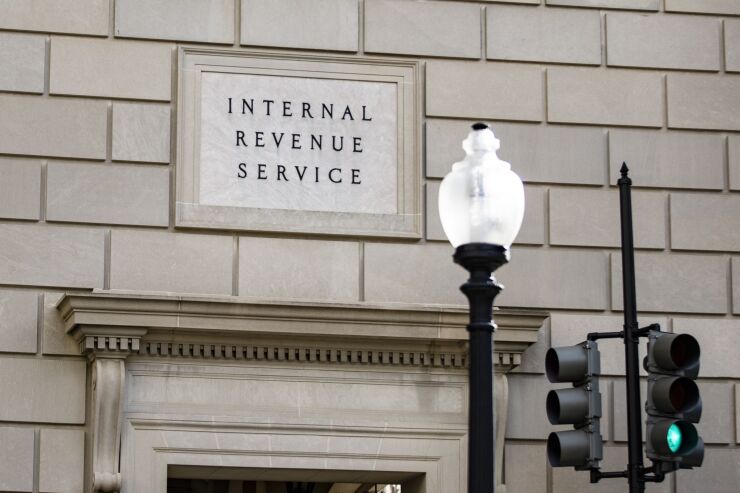The Internal Revenue Service kicked off tax season Monday facing a
The IRS has been rescinding job offers and posted on its
Last week, Trump formally nominated Billy Long, a former Republican congressman from Missouri, as IRS commissioner, after announcing his intention last month to nominate Long, even though then-commissioner Danny Werfel's term wasn't set to end until Nov. 12, 2027. Werfel announced he would be
Tax season ran
"Busy season is always terrible, but I think it's going to be sort of business as usual because there are no major expiring provisions to deal with," said Bill Smith, managing director of CBIZ Advisors' National Tax Office.
But there could be problems with the hiring freeze, especially with the IRS already having trouble recruiting enough employees. "A third of the workforce is eligible for retirement, and if you hire new people, they don't come in as senior auditors, they come in out of college or relatively inexperienced for the most part," said Smith. "It takes two years to train them and get them marginally effective. If you kill all that, there will be a tremendous amount of natural attrition at the Service, and the attrition is going to be at the most experienced level, which will have a huge impact."
It's unclear when Long will get a confirmation hearing, but questions have already arisen over his promotion of the fraud-plagued Employee Retention Credit. Sen. Elizabeth Warren, D-Massachusetts, a member of the Senate Finance Committee, who will likely be at the hearing, has already sent Long a
"He has no tax background," said Smith. "The Democrats on the Senate Finance [Committee] were asking about all of his interactions with the Employee Retention Tax Credit company he was working for. He's on record as saying everybody's eligible. He's on record as saying even if your accountant told you you're not eligible, come see us. You've got the IRS over the last several years prosecuting companies for illicit claims for the Employee Retention Tax Credit. And these two companies that he was affiliated with seem to have been doing exactly that. That's in addition to the fact that he has no tax experience as an attorney, accountant or Enrolled Agent. He's a certified auctioneer. That seems to be his lone certification."
Long has said he's a Certified Tax and Business Advisor, but according to
Some believe the IRS needs to do more to speed up the processing of ERC claims. National Taxpayer Advocate Erin Collins
"I've been hearing the exact same issues from taxpayers, CPAs lawyers, ERC firms, as well as government officials' frustration about the overall management of the program," said Jesse Morton, a managing director at Berkeley Research Group. "Somebody who actually has experience with the program and is knowledgeable about the good, the bad and the ugly of the program has a perhaps better and more realistic perspective, I think, is going to be positive for the IRS, and certainly positive for the 1.2 million taxpayers that are currently waiting on their pandemic relief, and have been waiting on it for, in some cases, years."
Long perhaps may make a priority of speeding up ERC claim processing at the IRS. The Taxpayer Advocate noted that as the report was going to press, Werfel announced in mid-December he expects that approximately 500,000 additional claims will be processed in 2025, but the details and timing of the refunds are still to be determined. However, with the extra $20 billion in budget cuts and the hiring freeze, it's unclear when or if the IRS will return to other priorities from Werfel such as
'They hired — were trying to hire 88,000 new workers to go with you, and we're in the process of developing a plan to either terminate all of them or maybe we move them to the border," Trump said during a rally in Las Vegas, according to the
These echoed
"Upon issuance of the OMB plan, this memorandum shall expire for all executive departments and agencies, with the exception of the Internal Revenue Service (IRS)," says the executive order. "This memorandum shall remain in effect for the IRS until the Secretary of the Treasury, in consultation with the Director of OMB and the Administrator of USDS, determines that it is in the national interest to lift the freeze."
As he signed the order, Trump remarked, "We're going to take those 88,000 — let's see if they'd like to work on the border because that's where we want them really."
He seemed to be alluding to the 87,000 armed IRS agents who were supposedly going to be hired by the Biden administration, although that claim has
Nevertheless, the extra
"It's a little frightening to think about what might happen in the IRS if he gets confirmed," said Smith. "You almost want to tell your clients, you've got a four-year holiday because the IRS isn't going to go after anybody during this period of time. You can't do that, of course, because it would be unethical. But all of the initiatives they were talking about, like spending a lot more money on auditing big partnerships, that would be an important and very money-making operation for the IRS and the United States. But I would guess they're going to scale back audits, which are already at kind of historic lows, so I think it will have a very big impact if he's confirmed."






